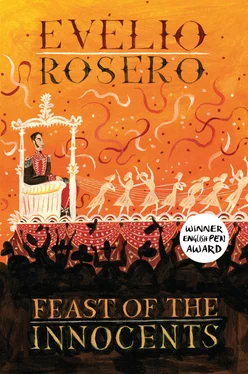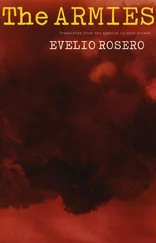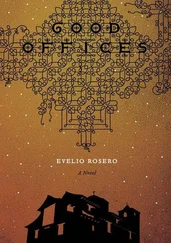“Seráfico’s son,” Sinfín told him. “I thought he had already escaped, yesterday. But he’s a sharp one, he’ll know how to get to Sandoná.”
“You invited him to the flower party?” The doctor was amazed.
“He’s a good boy,” was all Sinfín said by way of an answer. “He can’t read or write, but he likes singing. Thank God he’s still alive.”
Floridita and the maid burst out laughing. Sinfín showed her disapproval with a shake of the head.
“It’s a wicked, wicked, wicked world,” she said again.
Sinfín had her eyes half-closed, sorrowing, on the verge of tears — the doctor thought — and she remained engrossed, as if she were glimpsing, on the narrow horizon of the garden, everything to come, the next few years, and years far into the future, and found them grey, unchanging, really identical, but ominous too: she gave herself little pats on the forehead while saying, like a complaint to no-one in particular, “it’s a wicked, wicked, wicked world.”
The doctor ordered Floridita to go to her room:
“No carnival for you today. Shut yourself in there, till tomorrow.”
Floridita shrugged.
“I don’t care,” she said. “I can play on my own.”
And off she went.
Then they heard a groan from the gardener, as if he were waking up.
“The poor thing’s lovesick,” Sinfín said, “and doesn’t learn; he suffers without learning a thing, suffers right in his guts.”
“Oh, my darling,” Homero said, “where am I? What did they do to me? It’s so hot, what bastards, where are they? I want my revenge.”
He opened his eyes and looked around him; he did not seem to recognize anyone, but he did seem to remember something, very far off:
“Take me to that bandit girl, she killed me, bring her to me, living without her is impossible.”
The maid, all ears, burst out laughing again; she sought the doctor’s eyes — as though summoning his approval, but the doctor did not share in the joke.
“Love is made of glass, my friend,” Sinfín said, leaning in towards the gardener’s ear, “sooner or later it shatters. Don’t let it get you down, take my advice, a good lunch and plenty of sleep, that’s all you need.”
“So feed him up,” the doctor said, “and let him sleep. You’re always right, Genoveva. Bring him back to life.”
“Doctor, dear doctor,” Homero said, recognizing him and stretching out his arms. “Give me back the monkey costume. It’s unlucky. I’ll burn it.”
But the doctor had already left the garden.
“What are you dressing up as, Papá?”
The doctor was in his room, about to put on the great ape head. Floridita was watching him from the doorway, without emotion. If that was his daughter, he thought, she was unrecognizable. Anyway, shouldn’t she be shut in her room? Why did she ask that question if she already knew what he was dressing up as? Or did she want to initiate a conversation, be forgiven? But what was that about, locking a little boy in a chest all night? And the shorn head and bird muck? How would he punish her? And yet, a kind of tenderness took hold of him: she was his baby girl.
“As an orangutan,” he said.
There was a strange silence; the doctor thought it was the first time he and Floridita had looked each other in the eye.
“Do you want me to tell you why I’m dressing up?”
He thought that he finally had the chance for a chat with his daughter. He had already thought of his answer — when she asked him why—“All the better to frighten you,” he would say, imitating the wolf in the story. Then he would give her a hug.
However, Floridita did not oblige:
“No,” she said, “I don’t want to know why.”
She said it as if she were winning a game.
She was leaning up against the door frame, looking at him with glinting eyes; at that moment she looked as though she was either going to cry or insult him; she turned and fled. He finished putting on the giant ape head: the mechanism in the throat did not work; he heard his voice just like normal. “What’s going on here?” he had said. He had his daughter’s glinting eyes engraved on his memory. “She’s another Primavera,” he thought, “she’s more like her than she is me: she hates; she’s stronger than me.”
Minutes after Doctor Justo Pastor Proceso López left his house dressed as an orangutan, a carnival donkey arrived at his door looking for him.
Floridita, Genoveva Sinfín, the maid and the revived gardener were leaning over the balcony. Maltilde Pinzón, recently arrived in the company of her two sons and Luz de Luna, was presiding: they were all waiting for Primavera so they could go out and watch the parade; where on earth was she? Maltilde was getting impatient: Primavera had them all used to her ways. And what a surprise; suddenly a participant in the parade itself appeared in their street, under the balcony: a gleaming carnival donkey no less, capering about in front of them, among the happy people. They even saw that the multicoloured donkey stopped by the house, bowed as if in greeting, and kicked softly at the door, like it was knocking. The music around them got louder: an explosion of tambourines and drums. They saw the man who was inside the donkey’s head emerge: his painted face was a grimace of delight, he had his hair streaked red and blue; he drew a bottle from inside his jacket and waved it about.
“And the good doctor?” he shouted up to the gathering on the balcony. “I want to drink a toast with him.”
Sinfín yelled that the doctor was not at home:
“Wait for him, he’ll be back.”
“We’ll look for him,” shouted the smiling Quiroz. He was going to get back inside the donkey head, when the little girl on the balcony caught his attention:
“Are you looking for Papá?”
“Of course,” Quiroz said.
“Well you won’t find him,” the girl hollered back. “He’s dressed up.”
Quiroz paused in suspense; the girl’s face glowed, as if she were saying: “Aren’t you going to ask me what Papá dressed up as?” At that moment Platter Ilyich came out from inside the donkey; he wiped the sweat from his forehead, his painted face was running, his hair a yellow clump.
“And what is he dressed up as?” he hollered.
The girl did not hesitate:
“An orangutan,” she told them.
And, not yet knowing why, Genoveva Sinfín felt as if the air were actually growing dim, the feeling of ill omen that was running through her that morning solidified, and she crossed herself as she heard Floridita’s reply.
And why an orangutan? Why this costume? Suffocation. Do I imagine discovering her without her discovering me, following her without her knowing who I am? How pathetic.
No-one pointed at him, his costume lacked soul: the ape was just one more participant in the carnival; Homero had really made him hate it now. He was skirting the street full of hands and heads stretching towards the avenue like branches; at least the disguise meant they did not recognize him. No floats were visible from the Obelisk; the carnival was growing apace; any arm, any hand could stretch out towards him from anywhere, stroke him, squeeze him or strangle him, he thought. At that moment he was assailed by a trio of formidable pigs, yoked together as horses from the crusades: the red crosses glowed from silk cloths covering their flanks, they squealed madly, he had to jump out the way; a dwarf couple were driving them along; very close by, a knot of black women were dancing with lit candles in their hands; one of them started to dance in front of the gorilla: her silhouette blazed amid beads of sweat; he heard horses’ hooves clattering on the pavements, heard their whinnying; he smelled the pungent smoke of marijuana; beardless young men were smoking it beside him, sucking eagerly on the joints; someone yelled that they could see the first float of the carnival coming, elbows and knees shoved him; a little girl was crying, lost, she ran without direction through the carnival, not a puff of talc on her dress — as if protected under an invisible glass dome — in her hand she was carrying a sunflower bigger than herself. A finger sank itself into his hairy chest, three, four, five times; a voice:
Читать дальше












